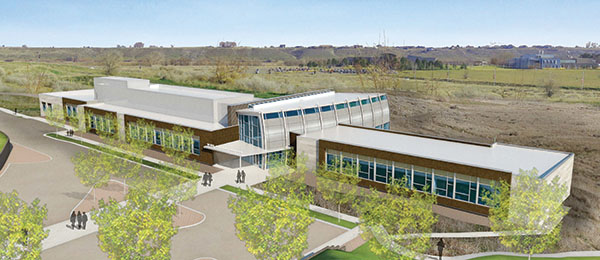The recent groundbreaking of Washington State University’s Wine Science Center is not just about the ceremonial start of construction on a new state-of-the-art facility. It’s about the future of Washington’s wine industry. The new wine center, being built at WSU Tri-Cities, helps fulfill the state wine industry’s vision of becoming a world-class wine region.
The groundbreaking in September of a 40,000-square-foot building celebrates a great milestone for WSU and the state’s wine industry, Ted Baseler, chief executive officer of Ste. Michelle Wine Estates and a WSU Regent, said during the ceremony. “Every great wine region in the world has a signature institution that supports the wine industry with research, and now we do, too.”
The $23-million center will include a research and teaching winery, research laboratories, classrooms, conference rooms, and a regional and international
wine library.
Lydig Construction, Inc. and ALSC Architects of -Spokane are designing and building the project. -Construction is expected to be completed by early 2015.
The vision to become a premium wine region began years ago, Baseler told the crowd of about 200 growers, winemakers, and university, state, and local officials. “It began in the 1960s when Drs. Walter Clore and Chas Nagel convinced pioneering growers that they could grow world-class wines in Washington,” he said. “And those old guys were right.”
First AVA
Washington’s first American Viticultural Area, the Yakima Valley, was approved in 1983, said Steve Warner, head of the Washington Wine Commission. Since then, 12 more appellations have been designated in the state.
Some 350 growers produce grapes for about 800 wineries bonded in the state, according to Warner. He said that based on 2011 data, the wine industry contributes $8.6 billion to the state’s economy. The Wine Commission projects that the economic impact will -triple to $25 billion by 2020.
The Wine Science Center, a result of the Wine Commission and the Washington Association of Wine Grape Growers coming together, will help the state’s wine industry reach its potential, Warner added.
WSU’s Viticulture and Enology Program has grown to 33 faculty involved in teaching, research, and extension activities, a number similar in size to the wine program at the University of California, Davis, according to Dr. Thomas Henick-Kling, program director. WSU offers the only four-year bachelor’s of science degree in the state for viticulture and enology and a two-year distance-learning certificate. Current enrollment includes more than 50 undergraduates, 29 graduates, and 120 in the distance-learning component.
Hub
“The Wine Science Center will be a world-class facility,” Henick-Kling said, adding that it will give much-needed space for students and research. “It will serve as a hub for students, researchers, and the industry.”
Governor Jay Inslee, who also participated in shoveling the dirt, said the center “symbolizes the power of partnerships” and represents future economic growth for the state. “When you think about tripling the wine industry’s economic impact to $25 billion, wouldn’t it be great to think that although we’ve been known for our Boeing and Microsoft industries, we’ll also be known for our wine industry,” he said.
More than $19 million of the $23 million needed has been pledged or donated in the last two years as part of the WSU fundraising campaign chaired by Baseler. Major funding for the center comes from the Washington Wine Commission’s pledge of $7.4 million generated through grower and winery self-assessments, $5 million contributed by the state, and $2.06 million from the U.S. Economic Development Administration. The Port of Benton donated land valued at $350,000. WSU is leading financing and fundraising efforts and the City of Richland is managing the Wine Science Center Development Authority, which oversees construction. Once the center is built, the development authority will donate the center to WSU.
More than $4.5 million has been donated through corporate and private commitments and in-kind donations of equipment and professional services. Most recently, two California companies—Cooperages 1912 and Oak Solutions Group—owned by the Boswell family pledged $250,000 and a decade’s worth of wine barrels. Another major cash donation of $100,000 comes from Hamilton Cellars, a small winery in Richland. The winery’s contribution is being matched by another WSU benefactor to make the pledge worth $200,000.
Last year, Spokane Industries, manufacturer of stainless steel tanks, pledged $600,000 worth of tanks for the new research winery. An anonymous contribution of $500,000 was given early on.
“We have $2 million left to go in raising funds for the building and $2 million left that’s needed for equipment,” said Baseler, adding that the campaign committee continues to work towards reaching the goal of $23 million. •
For more information, visit www.wine.wsu.edu/campaign.


Leave A Comment